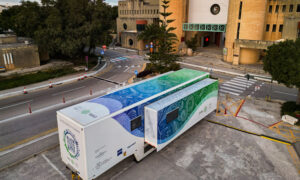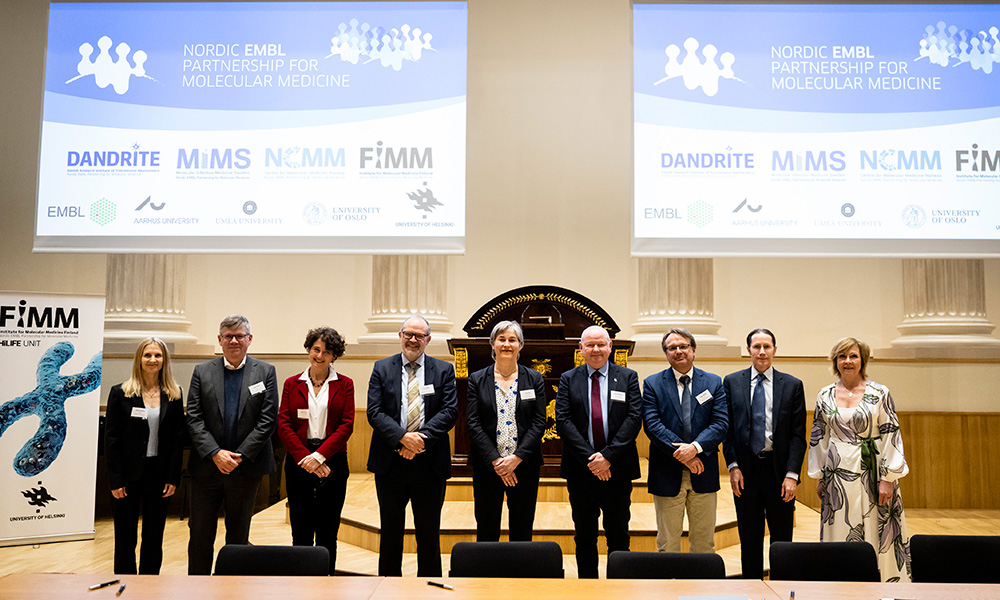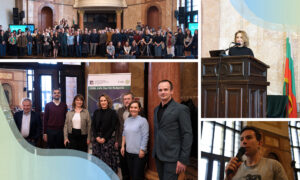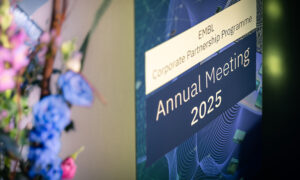
Celebration of the next ten years of the Nordic EMBL Partnership for Molecular Medicine
The Nordic EMBL Partnership for Molecular Medicine celebrates the signing of its renewed agreement for the next ten years between the EMBL and the Universities of Aarhus, Oslo, Umeå, and Helsinki

By Nóra Lehotai, Communications Officer for the Nordic EMBL Partnership for Molecular Medicine
Signing Ceremony of the second renewal agreement hosted by the University of Helsinki and its Rector, Professor Sari Lindblom, at the University of Helsinki
The Nordic EMBL Partnership for Molecular Medicine is a unique collaboration between EMBL and the Universities of Helsinki, Oslo, Umeå and Aarhus. In 2023, it was time to commemorate the second renewal of this partnership with an agreement for the next 10 years (2023-2033).
On 2 May 2023, guests gathered early afternoon in the University Great Hall of the University of Helsinki to attend the festivities. Rectors of hosting universities of each node of the Nordic EMBL Partnership, Directors and members of the nodes, together with selected national representatives of governmental and funding bodies, were present to witness the signing of the new agreement and celebrate the coming ten years of the Nordic EMBL Partnership.
Rector Sari Lindblom opened the programme by welcoming the audience. Edith Heard, Director General EMBL, continued with a keynote talk highlighting the power of teaming up as a partnership. She then further emphasised the significance of the Nordic EMBL Partnership. Outgoing FIMM Director Mark Daly, former Speaker for the Nordic EMBL Partnership, followed with the second keynote talk, where he spotlighted the Finnish aspects and strengths of the Nordic EMBL Partnership and what international impact FIMM makes in the field of molecular medicine. Thereafter, Rector Sari Lindblom initiated the ceremonial signing of the Nordic EMBL Partnership agreement, which was signed by Edith Heard (EMBL Director General), Rector Sari Lindblom (University of Helsinki, hosting FIMM), Mark Daly (outgoing FIMM Director), Prorector Eika Berit (Aarhus University, hosting DANDRITE), Poul Nissen (DANDRITE Director), Rector Hans Adolfsson (Umeå University, hosting MIMS), Oliver Billker (MIMS Director), Rector Svein Stølen (University of Oslo, hosting NCMM), and Janna Saarela (NCMM Director).
The programme continued with a reception where Rector Sari Lindblom and EMBL Director General Edith Heard raised a toast to commemorate the agreement, and attendees were invited to enjoy refreshments and socialise. It was a great opportunity for everyone to network. After the reception, selected stakeholders participated in a roundtable discussion focusing on the value of the Nordic EMBL Partnership from a local, national, and Nordic perspective. The event provided a platform for host universities and other stakeholders to share their insights. The exclusive dinner following for the signatories and invited roundtable guests, hosted by Rector Sari Lindblom, continued the discussions to foster positive collaborations between international guests.
Looking forward to the next ten years of Molecular Medicine research with a scientific symposium on 3 May 2023
The festivities continued the next day with a hybrid scientific symposium at Biomedicum Helsinki, highlighting some of the outstanding Molecular Medicine research carried out by leaders and national partners of the EMBL network. This event provided an overview of the partnership’s achievements, emphasising core infrastructures and international collaboration, some of the key characteristics that make EMBL research special. In addition, the symposium looked forward to what is to come in the area of Life Science cooperation and Molecular Medicine research in the next 10 years of the Partnership.
After the opening of the symposium by Mark Daly, outgoing FIMM Director, EMBL Director General Edith Heard gave an insight into molecular epigenetics in development and disease through the lens of the X chromosome. DANDRITE Director Poul Nissen continued with details of how to inform molecular medicine using neurobiological insights.
The following talks highlighted some examples of cross-border collaborations between the partnership nodes. They described a broad range of topics, from genome medicine to microbiome studies. NCMM Director Janna Saarela spoke about inherited errors of immunity, ranging from molecular mechanisms to cell therapy. Craig Primmer, Vice Dean Research, HiLIFE/Institute of Biotechnology & the Faculty of Biological and Environmental Sciences, introduced the audience to the framework of the new EMBL programme, ‘Molecules to Ecosystems’, by talking about conservation genomic approaches for promoting biological resilience.
The last scientific talk was given by MIMS Director Oliver Billker, who described the current understanding of pathogen biology and how it can be used to design new interventions. The closing words by FIMM Vice-Director Samuli Ripatti concluded the symposium for in-person and online participants, providing the latest insights into various areas of molecular medicine and biology research.
The Nordic EMBL Partnership impacts society at the national and European level
Statements from the four Nordic node Directors mark the benefits of the partnership between EMBL and the research nodes in the Nordic countries. They describe it with the following words:
This partnership provides “opportunities for joint proposals, mobility, training networks, and the exquisite EMBL facilities and new frontiers.” “The EMBL model to recruit early-career researchers based on scientific excellence combined with the increased international visibility provided by the partnership” enables the nodes “to attract global expertise to the Nordics thus strengthening the Nordic research environment at many levels.” The partnership “facilitates the impact and reach of Nordic science throughout Europe and the world.”
Plamena Markova, Head of International Relations EMBL, highlights EMBL’s mission to foster excellent science, and how this mission is manifested through the Nordic EMBL Partnership:
“One of EMBL’s pivotal missions is to nurture and enable excellence in science across borders and disciplines. The Nordic EMBL Partnership is a true manifestation of this. It brings four countries and EMBL together in a joint effort to create national centres of scientific expertise with wider regional and European impact. In a unique way, the partnership funnels international talent to the four Nordic countries and builds interconnected hubs with complementary expertise that is shared for the benefit of the Nordic community of scientists. With its focus on disease-targeted research, the partnership adds valuable new perspectives to EMBL’s scientific portfolio. It enables novel collaborations with critical importance for human and planetary health.”
Finally, Oliver Billker as the current Speaker for the Nordic EMBL Partnership, reflects on the future role of the Partnership at the field of Molecular Medicine:
“Molecular medicine affects all our lives, but it is a fast-moving research field. No Nordic country can individually excel in all its aspects. Collaboration in this area is essential to bring the benefits of molecular medicine research to all our societies. Our partnership with EMBL exemplifies how it can be done. In the future, we want to broaden and deepen our interactions further. We see many ways to achieve this, for instance, by inspiring and funding collaborative research, linking our training activities even more, and networking our complementary research infrastructure further. These interactions facilitate a valuable cross-fertilization of ideas that enhances the quality of our research and training endeavours. I am personally excited by the opportunity to facilitate these developments.”
History of the Nordic EMBL Partnership for Molecular Medicine
The Nordic EMBL Partnership for Molecular Medicine is a unique network of national research centres with complementary research expertise at the forefront of molecular medicine research. The centres combine the longstanding tradition of basic and translational molecular medicine in the Nordic countries, focusing on core research infrastructures and implementing the governance and operational models of EMBL.
The Nordic EMBL Partnership was initiated as a collaboration in 2007 between EMBL and FIMM at the University of Helsinki (Finland), MIMS at Umeå University (Sweden), and NCMM at the University of Oslo (Norway). The initiation involved the establishment of national partnership nodes in the three countries. The Nordic EMBL Partnership expanded in 2013 when DANDRITE at Aarhus University became the Danish node. The impact and success of the Nordic EMBL Partnership was formally recognized in 2013 with the signing of a renewed partnership agreement for 10 years (2013-2023), and with the current second renewal, until 2033.


